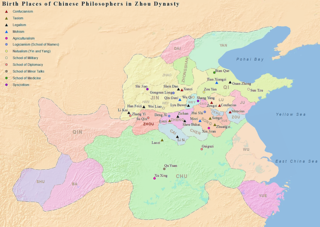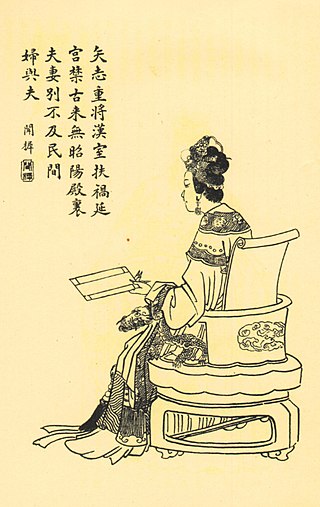Xu Gan (Chinese: 徐幹, pinyin Xú Gàn, 171 – March or April 218? [1] ), courtesy name Weichang (偉長), was a Chinese philosopher and poet of the late Eastern Han dynasty. He was also one of the "Seven Scholars of Jian'an". He is best known in the West for his discourse on the relationship between the names and actualities, preserved in his treatise Zhonglun (中論), or "Balanced Discourses".
Contents
Life
Born in Ju County, Beihai Commandery (east of present-day Lechang, Shandong), Xu Gan developed a reputation for good memory and diligent studies as a youth. Around 189, Xu Gan left his residence in Linzi and went into hiding on the Jiaodong peninsula.
Although living in tumultuous times, and seeking at causes of decline, his work's introduction, written from the viewpoint of a reverent disciple, suggests his exile more self-imposed for the sake of Confucianist study than any outcast status, even if some his politics might have been at variance. He seems to have been familiar with the "Legalists", but is not that unusual for his time and advocated that reward and punishment should be consistent rather than extreme, fitting alongside his other "Balanced Discourses."
It has been suggested that his writing were directed at Cao Cao. After participating in Cao Cao's campaigns, the Records of the Three Kingdoms state that he was appointed magistrate of Shanghai, but did not serve. He did serve as Minister of Works, from 197-208, and literary advisor until 211. [2]
Literature
- John Makeham, Name and Actuality in Early Chinese History. State University of New York Press, Albany, 1994.
Translations
- Balanced Discourses: a Bilingual Edition. English translation by John Makeham; Introductions by Dan Shengyuan and John Makeham. Yale University Press, 2002.
Related Research Articles

The School of Names, or School of Forms and Names, is a school of Chinese philosophy that grew out of Mohism. Sometimes termed Logicians or Sophists modernly, Han scholars used it in reference to figures earlier termed Disputers in the Zhuangzi, as a view seemingly dating back to the Warring States period. Although not a unified movement like the Mohists, it more or less represents an actual social category of early linguistic debaters. Some arguments in Mohist texts would appear directed at their kind of debates. Figures associated with it include Deng Xi, Yin Wen, Hui Shi, and Gongsun Long. A Three Kingdoms era figure, Xu Gan, is relevant for discussions of names and realities, but was more Confucian and less relativist.

Emperor Xian of Han, personal name Liu Xie (劉協), courtesy name Bohe, was the 14th and last emperor of the Eastern Han dynasty in China. He reigned from 28 September 189 until 11 December 220.

Xiahou Yuan, courtesy name Miaocai, was a Chinese military general and politician serving under the warlord Cao Cao in the late Eastern Han dynasty of China. He is known for his exploits in western China in the 210s, during which he defeated Cao Cao's rivals Ma Chao and Han Sui in Liang Province and the surrounding areas, and forced several Di and Qiang tribal peoples into submission. He was killed in action at the Battle of Mount Dingjun while defending Hanzhong Commandery from attacks by a rival warlord Liu Bei. Xiahou Yuan's death was highly dramatised in the 14th-century historical novel Romance of the Three Kingdoms, in which he was slain by Liu Bei's general Huang Zhong during a surprise raid.

Kong Rong, courtesy name Wenju, was a Chinese poet, politician, and minor warlord who lived during the late Eastern Han dynasty of China. He was a 20th generation descendant of Confucius. As he was once the Chancellor of Beihai State, he was also known as Kong Beihai. He was defeated by Yuan Tan in 196 and escaped to the capital Xuchang. For being a political opponent of Cao Cao and humiliating him on multiple occasions, Kong Rong was eventually put to death on various charges.

Yue Jin, courtesy name Wenqian, was a military general serving under the warlord Cao Cao in the late Eastern Han dynasty of China. He was noted as much for his short stature as for his valour and ferocity on the battlefield. Yue Jin participated in most of Cao Cao's early military exploits, and gained multiple successes in the campaigns against Lü Bu, Liu Bei, remnants of the Yellow Turban rebels, and Yuan Shao and his associates. He was particularly praised as a capable vanguard, but his most famed accomplishment came with his supporting role in the defence of Hefei against Sun Quan's forces at the Battle of Xiaoyao Ford of 214–215.
Wang Can, courtesy name Zhongxuan, was a Chinese politician and poet who lived during the late Eastern Han dynasty of China. He contributed greatly to the establishment of laws and standards during the founding days of the vassal kingdom of Wei – the forerunner of the state of Cao Wei in the Three Kingdoms period – under the warlord Cao Cao, who was the de facto head of the Han central government in the final years of the Eastern Han dynasty. For his literary achievements, Wang Can was ranked among the Seven Scholars of Jian'an.
Zang Ba, courtesy name Xuangao, was a military general who lived during the late Eastern Han dynasty and Three Kingdoms period of China. He served the warlord Tao Qian initially, followed by Lü Bu and finally Cao Cao and his successors, but for the most part of his career, he remained semi-autonomous over his troops and eastern China. The years of his birth and death are not recorded, but he served the state of Cao Wei in the Three Kingdoms period until the reign of the second Wei emperor, Cao Rui.

Fu Shou was an empress of the Eastern Han dynasty of China. She was the first wife of Emperor Xian, the last Han emperor. She is best known for initiating a conspiracy against Cao Cao, the ruler of state of Cao Wei.
Cao Jie, posthumous name Empress Xianmu, was the last empress consort of the Eastern Han dynasty of China. She was the second wife of Emperor Xian, the last Han emperor, and became known as the Duchess of Shanyang after her husband's abdication. She was a half-sister of Cao Pi, who ended the Han dynasty by forcing Emperor Xian to abdicate the throne in his favour and established the state of Cao Wei. She fiercely opposed the coup d'état orchestrated by Cao Pi, repeatedly refusing to hand over the imperial seal.
Chen Lin, courtesy name Kongzhang (孔璋), was an official, scholar and poet who lived during the late Eastern Han dynasty of China. He was one of the "Seven Scholars of Jian'an". He later served as Military Advisor to Cao Cao.
The Battle of White Wolf Mountain was fought in 207 in the late Eastern Han dynasty of China, preceding the Three Kingdoms period. The battle took place in northern China, beyond the frontiers of the ruling Eastern Han dynasty. It was fought between the warlord Cao Cao and the nomadic Wuhuan tribes, who were allied with Cao Cao's rivals Yuan Shang and Yuan Xi. The victory attained by Cao Cao dashed the hopes of a Wuhuan dominion, and the Wuhuan eventually became weakened, lost importance, and were gradually absorbed into the Han population or the Xianbei tribes.
Seven scholars of Jian'an or Chien-an, also translated as the "seven philosophers or masters of Jian'an", were a group of seven Chinese intellectuals of the late Eastern Han dynasty. The name was coined by Cao Pi. The Jian'an era was the era from 196–220 during the reign of Emperor Xian. Known as the time of unrest preceding the Three Kingdoms era, the period gained popularity in the East Asian culture.

Jian'an poetry or Chien-an poetry, refers to the styles of Chinese poetry particularly associated with the end of the Han dynasty and the beginning of the Six Dynasties era of China. This poetry category is particularly important because, in the case of the Jian'an poetic developments, there is a special difficulty in matching the chronology of changes in poetry with the usual Chinese dynastic chronology based on the political leadership of the times. For example, according to Burton Watson, the first major poet of the new shi style that emerged at this time was Cao Zhi, one of the sons of Cao Cao, a family which came into power at the end of Han and developed further during the Three Kingdoms era of the Six Dynasties period.
Six Dynasties poetry refers to those types or styles of poetry particularly associated with the Six Dynasties era of China. This poetry reflects one of the poetry world's more important flowerings, as well as being a unique period in Classical Chinese poetry, which, over this time period, developed a poetry with special emphasis on romantic love, gender roles, and human relationships. The Six Dynasties era is sometimes known as the "Age of Fragmentation", because China as a whole through this period lacked unification as a state, at least for any extended period of time; and, instead, many states rose and fell, often overlapping in existence with other states. Which of the various states and dynasties constituted the "6" dynasties of the Six Dynasties period varies somewhat according to which of the traditional selection criteria are chosen. The Six Dynasties era covers several somewhat overlapping main periods including all of the following: the Three Kingdoms (220–280), Jin dynasty, the Sixteen Kingdoms, and the Southern and Northern Dynasties (420–589). Sometimes, chronological discrepancies occur in regard to the turbulent political events of the time, from which these traditional historical-era designations derive, together with the somewhat different chronology of poetic developments. Thus, neither the lives of the poets nor the trends in their poetry fit gently and neatly together with these period dates. Furthermore, conversions to the Common Era dating system can create further complications. However, regardless of the chronological difficulties, major developments of poetry during the Six Dynasties include formalizing the distinction between the Jian'an era regular yuefu and the shi style poetry, further development of the fu, theoretical work on technique, and the preservation of both Six Dynasties and earlier poetry by collecting and publishing many of the pieces which survive today into various anthologies consisting all or in part of poetry.

Cao Cao (155–220) was a warlord who rose to power towards the final years of the Eastern Han dynasty and became the de facto head of government in China. He laid the foundation for what was to become the state of Cao Wei (220–265), founded by his son and successor Cao Pi, in the Three Kingdoms period (220–280). Poetry, among other things, was one of his cultural legacies.
Yuan Xian, courtesy name Zisi or Yuan Si, was a Chinese philosopher who was a major disciple of Confucius. Classic Chinese sources stated he was modest and incorruptible, and adhered strictly to the teachings of Confucius despite living in abject poverty.

Xu is a Chinese-language surname. In the Wade-Giles system of romanization, it is spelled as "Hsu", which is commonly used in Taiwan or overseas Chinese communities. It is different from Xu, represented by a different character.
Cao Li was a prince in the state of Cao Wei in the Three Kingdoms period of China. He was a son of Cao Pi, the first emperor of Wei. His mother, Consort Xu (徐姬), was a concubine of Cao Pi. He had two full sisters: the elder one was Princess Linfen (臨汾公主) while the younger one, who was unnamed, died early. Cao Li was enfeoffed as the Duke of Qin (秦公) in 221, with his dukedom in Jingzhao Commandery (京兆郡). In 222, he was elevated to the status of Prince of Jingzhao (京兆王). In 225, his title was changed to Prince of Yuancheng (元城王). He died in 229 during the reign of his half-brother Cao Rui. He has no offspring.
Cao Gan, also known as Cao Liang, was an imperial prince of the state of Cao Wei in the Three Kingdoms period of China.
Cao Xian (曹憲) was a Chinese noble woman member of the aristocrat Cao family during the Three Kingdoms period at the end of the Han dynasty, She was the daughter of the warlord Cao Cao, the King of Cao Wei, and she was a noble consort of Emperor Xian. Initially, her title was Furen ; in 214, her title upgraded to Guiren
References
- ↑ (文义未究,年四十八,建安二十三年春二月遭厉疾,大命陨颓,...) Quan Sanguo Wen, vol.55 (section: "Zhonglun Xu" (preface to the Zhonglun)). The month corresponds to 15 Mar to 12 Apr 218 in the Julian calendar. However, volume 21 of Sanguozhi indicate that Xu Gan died in 217 (22nd year of the Jian'an era), along with Chen Lin, Ying Yang (nephew of Ying Shao) and Liu Zhen ([徐]幹、[陈]琳、[应]玚、[刘]桢[建安]二十二年卒。).
- ↑ John Makeham 1994. p3. Name and Actuality
| Xu Gan | |||||||
|---|---|---|---|---|---|---|---|
| Traditional Chinese | 徐幹 | ||||||
| Simplified Chinese | 徐干 | ||||||
| |||||||
| International | |
|---|---|
| National | |